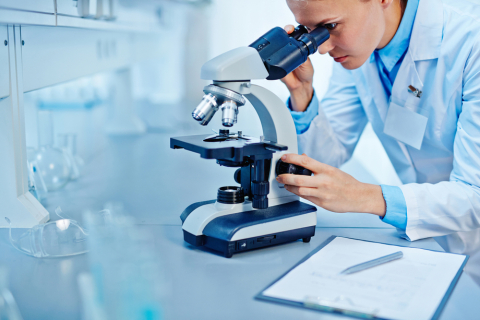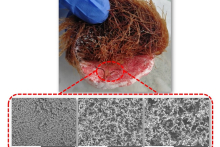The researchers from our Pharmacy Faculty have joined forces with the researches representing the Faculty of Chemical and Process Engineering of the Warsaw University of Technology. Their joint efforts gave rise to a platform using a fabric-reinforced organosilicon aerogel which can be used for in-vitro cultivation of rooted biomass. The works on the project have shown that the platform protects the roots against mechanical damage, i.e. it is beneficial to the cultivation process itself. There are, however, additional benefits. It also improves the biosynthesis of biologically-active compounds produced in the roots, which are sought after by the pharmaceutical industry. We have asked Assistant Professor Katarzyna Sykłowska-Baranek, PhD from the Department of Pharmaceutical Biology and Medicinal Plants Biotechnology of the Faculty of Pharmacy.
The platform allows us to receive pharmaceutically significant compounds – which ones, specifically?
The project aimed to develop a bio-functional platform for in-vitro cultivation of transgenic roots for the biosynthesis of Chicoine-derived naphthoquinone compounds with cytotoxic properties.
Why are the obtained compounds valuable, and which diseases can they be used for?
Chicoine and its derivatives show a multi-directional pharmacological activity. These compounds display anti-inflammatory properties, they are used in preparations which accelerate healing of wounds and burns, they also have anti-bacterial and anti-parasitic properties. The direction which is now under rapid development involves studying the anticancer properties of that group of compounds. In addition, Chicoine is a natural dye used in the cosmetics and food industry.
The project mentioned above serves as the starting point for further research – what are they going to consist in?
In the subsequent stage, we would wish to test the usefulness of the developed aerogel form in the process of obtaining other plant-derived compounds with healing properties, such as paclitaxel – an active compound in medication (e.g. Taxol), well-established for cancer treatment.
The project “Bifunctional aerogel platforms for the intensification of biosynthesis of cytotoxic naphthoquinones in in-vitro cultivation of transgenic roots” is financed under research subsidy of the POB Research Centre Biotechnology and Biomedicinal Engineering of the Excellence Initiative – Research University, implemented at the Warsaw University of Technology.
Composition of the research team: Maciej Pilarek, PhD, Eng., university professor (Warsaw University of Technology, Faculty of Chemical and Process Engineering), Katarzyna Sykłowska-Baranek, PhD (Medical University of Warsaw, Pharmaceutical Department), Bartosz Nowak, Eng. (Warsaw University of Technology, Faculty of Chemical and Process Engineering), Mateusz Kawka, Eng. (Medical University of Warsaw, Pharmaceutical Department), Kamil Wierzchowski, Eng. (Warsaw University of Technology, Faculty of Chemical and Process Engineering).

